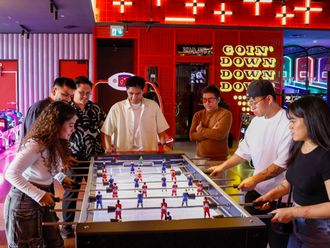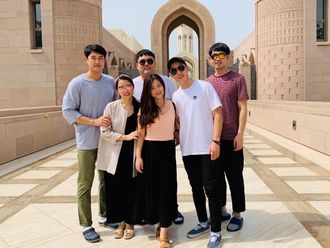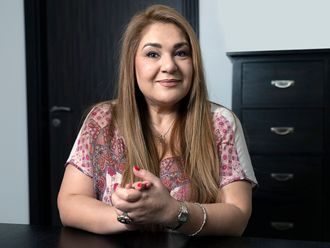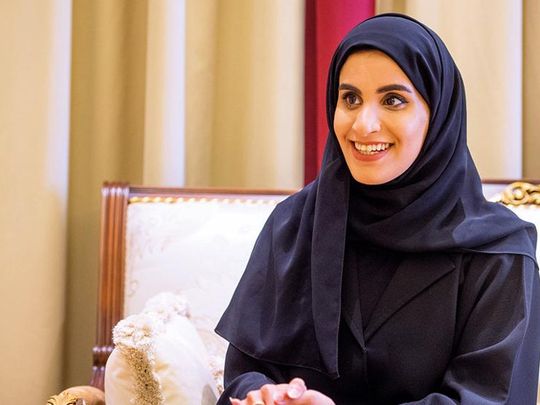
As a you enter the room, a lingering scent of tea with a hint of spices like cardamom and saffron greet your olfactory senses. On the shelves, cannisters are stacked with different varieties of tea – kadak, rose, a special homemade one called 9 blends. Personalised cards bearing the names of clients with the company’s sustainability policy neatly printed on them are spread out on a table.
Emirati entreprenuer Fatma Al Moosawi is the perfect host as she shows us around the outhouse in Al Barsha, which doubles up as the store for her home-grown tea brand Chai by Ygnd El Ras.
"Ramadan is a busy time of the year for me," says the 25-year-old entrepreneur. "Our sales during this time are almost five times usual."
Apart from being the first Emirati tea brand, what makes her business stand out is that it is a completely sustainable enterprise – turning tea waste into natural products like fertilisers and ink.
Born in Abu Dhabi as the youngest of six children, Fatma in a sense grew up around teas and the aroma of the beverage. She recalls tales her family told her of how she was introduced to tea at the age of four months by her father Ahmed Al Moosawi.
Back in 1962, her grandfather Syed Hussein Al Moosawi would return from his travels to places like Sri Lanka, India and Muscat with dainty bags of exotic teas to make his own special blend at home. "My father took up this tradition and tea time was a special event at our household," she says.
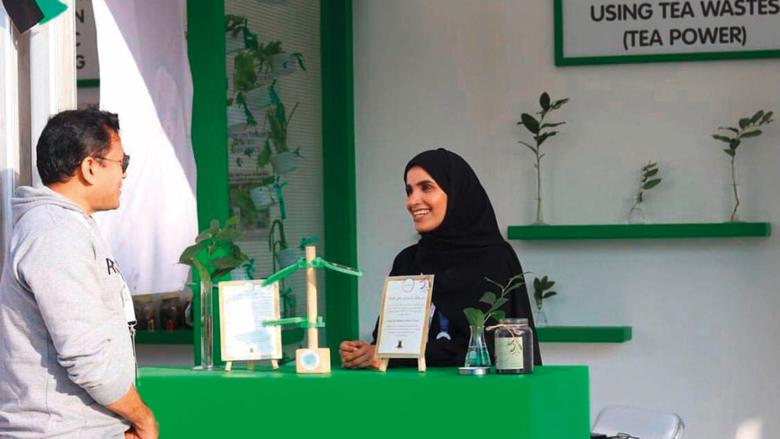
"About 30 minutes after lunch was quality family time when all of us would gather together and my father would make a cuppa. This apparently is the best time for tea to help the body to absorb nutrients from the food."
Fatma’s father worked with the Ministry of Foreign Affairs and he would use this time while sipping a cup of tea to share with the children news about world affairs and how the UAE was also on the path of devlopment. "Thanks to this tea time, all of us were well informed about worldly affairs. If we missed this tea time it was as if our whole day was not going well," she recalls.
As her father’s pet, Fatma accompanied him to quite a few important events and met ministers and other officials – situations that taught her the importance of being self-confident and observing the right manners and etiquette.
During such moments, tea drinking was common and Fatma says she would drink up to seven cups of tea a day, if not more. "It gives you a quick perk up you need for your daily tasks and peps up your mood immediately. I like to drink different blends throughout the day."
While in college, as there were three other students who shared her name, Fatma requested her professors and friends to call her Fatma Tea – a name that has stuck to date.
When her father passed away in 2015, she decided to take up the tradition of blending tea and used to give it to friends and relatives who visited her home in Dubai. Thanks to watching her father meticulously blend and prepare teas, Fatma is a professional of sorts and is known to heat up some terrific teas.
Keen to take her skills with tea to the next level, in 2017 she considered developing it into a business. "Coffee was witnessing a lot of innovations in the Arab world and people were savouring it, but tea was stuck with the basic Earl Grey, English Breakfast or Darjeeling varieties," she says.
After much thought she decided to name her company Ygnd El Ras (which means moodsetter in Arabic). "A lot of people said that the customers would not understand it. But I wanted it to be a unique brand with a truly Arab name."
Fatma’s brand quickly became the first in the world that mixes different kinds of tea from different parts of the world. "Since there are many nationalities in the UAE, I felt it would cater to every one’s tastes," she says.
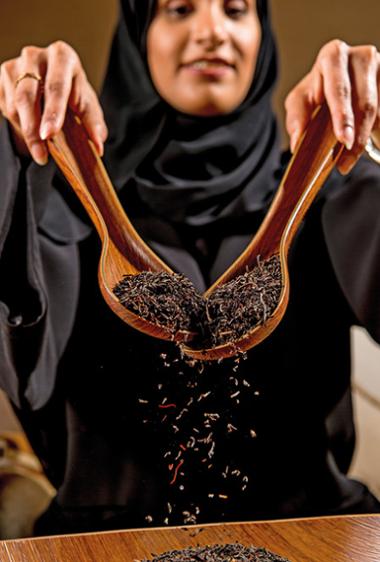
Opening her store in the Ramadan of that year with 50 packs of tea, Ygnd El Ras quickly became popular with youngsters, getting a lot of media for her novel business.
"Ramadan is always a special time for me as you feel pure inside out. Business wise it is the best month as people love to have a cup of tea after heavy iftars to feel refreshed," she says.
Fatma offers the complete set of tea products, including Della (Arabic pots), tea strainers, cups, glasses, mixing jars. All her products are eco-friendly; she doesn’t offer tea bags as they are difficult to be recycled.
Sustainable solutions
During her third year at the Zayed University, the student of Environmental Sciences did a project which measured the absorption of hard metals by tea leaves. "It was based on how tea waste can help purify water by absorbing these heavy metals," she says. "We’d always heard the elders in the family say how tea helps in the absorption of iron in the body. This lead me to do more experiments with tea and I found out that it absorbs other heavy metals including zinc and cadmium."
Though her professors told her that her undergrad project was on a PhD level and she didn’t have to try so hard, Fatma was determined that her project be more meaningful than just a drill to attain marks. The research was the first of its kind in the world and Fatma got approval from the Ministry of Economy and the Federal Competitiveness and Statistics Center to take it further. "Impure water undergoes six stages of purification and one of these stages is removing heavy metals. The technique used is expensive and consumes a lot of energy. With my research I am hoping to find a more feasible and sustainable way to extract these heavy metals," she says.
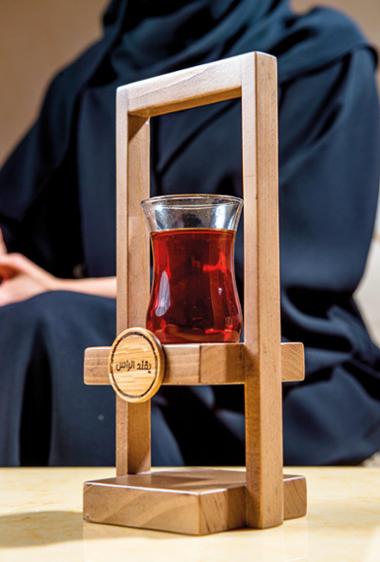
The youngster has also conducted research on natural fertilizers derived from tea waste. Using it on 10 plants in a 16-month period, she compared them with plants that depended on non-organic fertilisers and found that plants that depended on tea waste fertilizers were healthier and grew faster in comparison with those that depended on non-organic fertilisers.
Graduating in 2019, her project won first place in the Think Science Competition and was selected as one of the innovative projects in the youth sector of UAE innovation month.
"Did you know 3.6 billion tonnes of tea waste are produced from the Arab world alone," says Fatma. "If all these could be recycled, just imagine the impact we could have on the world."
Fatma is currently pursuing her master’s degree and working on what she calls her Tea power series, which includes recycling tea waste into natural matter, converting it into organic ink that is safe even for children. Her long-term goal is to turn tea waste into a renewable energy and its benefits be taught in colleges and schools.
Recently she won an award from Prodigy Bureau for her work in creating sustainable solutions. She is also a member of the Green Youth Majlis among other social initiatives.
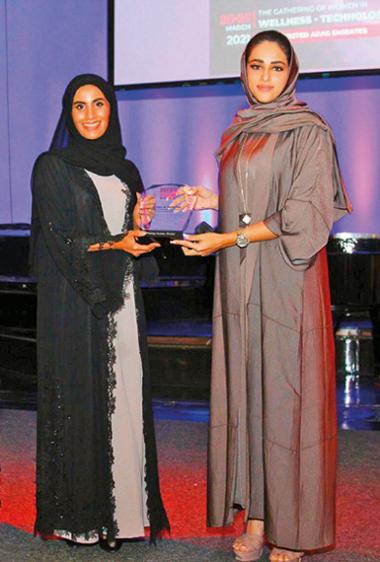
She cannot contain her excitement that Chai by Yngd Al Ras will be available on Google Store during Ramadan for people all over the world to enjoy. "It is not just a business for me, but a statement of my identity. I oversee all orders so that every delivery has a personally touch. I have added the story of the blends being passed on by generations on the packaging."
I ask her what is the best comment she has received to date.
Fatma smiles. "I was very proud when someone who tasted my tea said that my father would have been proud to see my success."
Benefits of recycling tea waste
1. It has all necessary minerals beneficial for plants.
2. It helps to prevent soil from becoming dry and maintains the variability of the water for the roots.
3. It acts as an insect repellant.
4. It is biodegradable.
5. It helps in reducing wastage.
For more info, visit @ygnd_elras on Instagram.




